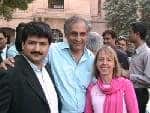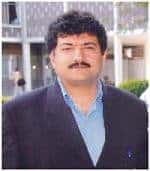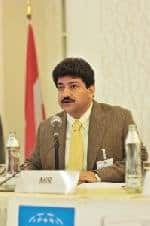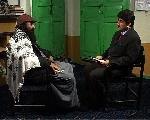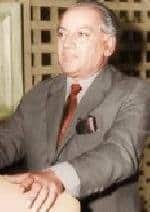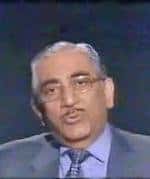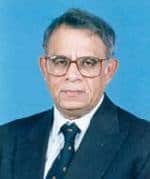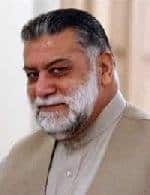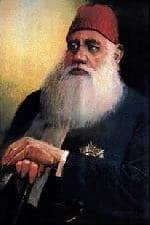Famous TV anchor Hamid Mir Pakistan
Hamid Mir is a famous top Columnist and an Anchor Person of a popular Geo TV network programme “Capital Talk”. Hamid Mir was born in (date of birth July 23, 1966). He is also known for his columns in top Urdu and English Newspapers. Mir was born and educated in Lahore Pakistan. He attended University Laboratory School New Campus and Government Central Model School, where he completed his Matric examination. He earned his intermediate degree from Government Science College and his B.A. degree from Government College. He earned his master’s degree in mass communications from the University of Punjab in 1989.
Hamid Mir belongs to the family, literary and journalistic. His grandfather, Mir Abdul Aziz, the famous poet in Urdu, Persian and Punjabi in Sialkot who participated actively in the movement for the establishment of Pakistan under the leadership of Mohammad Ali Jinnah. The father was Hamid Mir, the late Professor Waris Mir, a columnist in the newspaper Jang. Two brothers of Hamid Mir also journalists. Amir Mir is working in the international news and Imran Mir worked for Pakistan Television. And a third brother, Faisal Mir, is one of industrialists. Wife worked with Hamid Mir Pakistan Television and private TV channel for many years. Hamid Mir has two children, and Arafat Mir Mir Aisha.
Hamid Mir joined the daily Jang in 1987 and worked there as an editor subsystem, a reporter, feature writer and edition in charge. In 1994, split from the submarines purchase scandal in Daily Jang. Mir lost his job the day he published his article. In 1996, Mir became the editor of Pakistan in Islamabad, which makes him the youngest editor of a newspaper and a national Urdu press in the history of Pakistan. Lost his job again in 1997, when he wrote an article in the daily Pakistan of corruption in the government. Also in 1997, and joined the daily descriptions (Islamabad), and the founding editor.
In 2002, Hamid Mir joined GEO TV as an editor in the northern region. Since November 2002, the Forum has hosted Geo TV in the capital, a political talk show in which senior Pakistani politicians from the government and the opposition has emerged.
Indian newspaper the famous “The Hindu” wrote about the Pakistani journalist Hamid Mir, “he conducted interviews with bigwigs just about every politician in the modern world. In Pakistan, and the list includes President Pervez Musharraf and Prime Minister Shaukat Aziz, former prime ministers Benazir Bhutto and Nawaz Sharif. As for the movers and shakers of the wider world, there are savvy and U.S. Secretary of State Condoleezza Rice, along with Colin Powell controversial, Richard Armitage, and others. has also met with Afghan President Hamid Karzai in Afghanistan. newspaper known for the U.S. “Christian Science Monitor” declared Hamid Mir, a hero Pakistani media.
Hamid Mir became a voice of peace and objective journalism during the India-Pakistan tension created after the Mumbai attacks in November 2008. Der Spiegel declared him the Most Popular Journalist in Pakistan. Mir has participated in many international seminars and conferences on terrorism. He appears regularly on CNN, BBC and many Indian channels as a security analyst.
Interview
Do you think that the end of Taliban is near?
The end of Taliban is not near. I told BBC on 7th Oct that Taliban will not collapse easily. Three weeks are passed. Americans have failed to break Taliban. Taliban are moving their troops and weapons in the mountains. They are planning for guerilla war. They may lose some cities but they will continue their jihad. There will be no peace for Americans inside and out-side the Afghanistan.
How strong is the Taliban’s support base in Afghanistan?
The support for the Taliban in Afghanistan is increasing day by day. Blind use of military power by America is increasing the political power of the Taliban. No anti-Taliban leader can enter in Pashtun speaking areas.
How true are reports of large-scale defections from Taliban?
Some of the Uzbek-speaking warlords defected in Northern Afghanistan. They were not Taliban, they were allies, but more people are defecting from Northern Alliance to Taliban.
Are there any rifts within Taliban leadership?
There is no rift in Taliban. American and Pakistani intelligence agencies organized a grand meeting in Peshawar on October 21st to form a jirga [traditional meeting of elders] with defected Taliban commanders. They were not able to break even a single Taliban commander and the meeting was postponed. There are rifts within Northern Alliance. [Burhanuddin] Rabbani is against [Mohammed] Fahim, and Fahim is against Sayyaf.
What will happen in Afghanistan if Taliban are kicked out of power?
There will be no peace in Afghanistan if Taliban lose power. Public is against America. You will see that superpower will be humiliated in Afghanistan.
How well do you know bin Laden?
I know him from last four years. I met him twice, spend many days with him. He is not a scholar, he is a fighter. He wants to liberate Palestine. He wrote many poems against Israel. He is a jihadi [warrior] poet. His poems will come out very soon. I always ask him difficult questions and he answers my questions with patience.
Do you think that bin Laden is behind the 9-11 attacks?
I don’t think a man living in [the] mountains, without any communication facilities inside America can manage such kind of big operation.
Why do you think that he is being considered as a hero in the Muslim world?
Most of the people like him because people are against America. He is a hero by default. Many people don’t share his ideology [because he praised the September 11th attacks], but they are supporting the enemy of their enemy, which is America.
Give us your personal impressions of bin Laden?
He is a soft spoken, humble and simple man. He is very good in his behavior. He doesn’t behave like a terrorist.
When are you going to publish your book on bin Laden?
My book about Osama will be published in December 2001. This is a first book written after meeting him. It will be in English and Urdu [official language of Pakistan].
What kind of a man is Mullah Omar?
Mullah Omar is a real mujahid [fighter]. I think his stature is bigger than Osama. Osama takes orders from him. Osama became hero because of Omar. He is simple man who spent his most of time in mosque or on the battlefield. Mullah Omar is convinced that America is not after Osama, they are after Islam. Omar told me a year back that Osama came to Afghanistan in May 1996, Taliban captured Kabul in September 1996 and American Assistant Secretary Of State Mrs. Robin Raphel supported Taliban in November 1996. She was silent on Osama because America wanted to use Taliban against China and Iran, when Taliban refused, Americans created the issue of Osama bin laden.
How long can the Taliban survive the military attacks?
Taliban will not be routed. They can easily fight for more than a year.
Does [Pakistani President Pervez] Musharraf have what it will take to contain the pro-Taliban constituency in Pakistan?
Musharraf cannot control pro-Taliban feelings in Pakistan. He is playing with fire. He is pushing country towards civil war.
What do you make of charges by Western media which label the madrassas [religious schools] as breeding grounds of fanaticism?
Pakistani madrassas are not involved in fanaticism. What about secular fanaticism. The girl students in France are not allowed to cover their heads with scarf because they are Muslims, but Christian nuns are not stopped to cover their heads. Now the English speaking class in Pakistan is becoming pro-Taliban.
What kind of a future do you expect for Taliban, Pakistan and bin Laden?
They may be eliminated physically, but they will survive politically. Dead Osama will be more dangerous, thousands of new Osamas will born. The half of Pakistan will be converted into Taliban. One day Afghanistan will become symbol of pride for the Muslim ummah. [U.S. President George W.] Bush used the word “crusade”. This word came on his tongue because he hates Muslims. He has started crusade in Afghanistan, it will end up in America. His war is not against terror, this war is against error, and we can find out the error in the Middle East, in Kashmir and in Chechnya.
Hamid Mir Pictures
|
|
|
| ||||||||
|
|
|
| ||||||||
|
|

